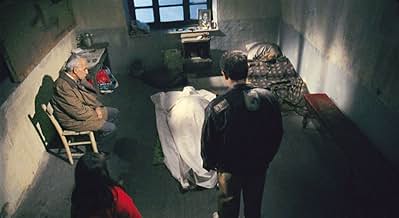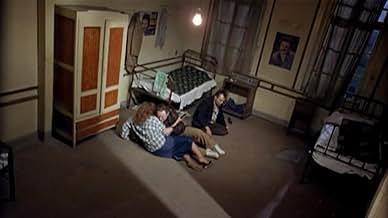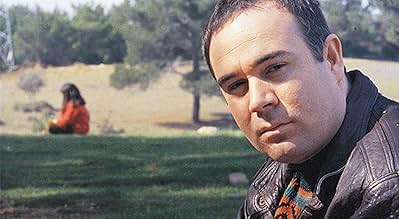Masumiyet
- 1997
- 1h 50min
CALIFICACIÓN DE IMDb
8.1/10
21 k
TU CALIFICACIÓN
Agrega una trama en tu idiomaYusuf is released from prison after serving a ten-year sentence. He is scared of life outside as he goes to an address given to him by another prisoner.Yusuf is released from prison after serving a ten-year sentence. He is scared of life outside as he goes to an address given to him by another prisoner.Yusuf is released from prison after serving a ten-year sentence. He is scared of life outside as he goes to an address given to him by another prisoner.
- Premios
- 20 premios ganados y 2 nominaciones en total
Yalcin Cakmak
- Cezaevi Müdürü
- (as Yalçin Çakmak)
- Dirección
- Guionista
- Todo el elenco y el equipo
- Producción, taquilla y más en IMDbPro
Opiniones destacadas
Probably one of the most depressing and strongest movie ever. But very enchanting scenario and poetic expression. That's where unrequited love would drift the man's life to rueful & how a man could have turned to be totally loser. Even for Haluk Bilginer's tirade-like dialog only , while sitting on the grass field at 42 min., it'd worth to watch. Theatrical acts, deeply heart-touching theme. Don't miss it. 9 of 10. After 6 years of this movie, director Zeki Demirkubuz, deeply impressed by Dostoyevski and Albert Camus' works, has directed a movie named Kader 'Fate' on 2006 which expresses the beginning of the story..I suggest you to watch both movie in a row..
Set in the seedier areas of İzmir, Ankara, and İstanbul, MASUMİYET focuses on Yusuf (Güven Kıraç) who is released from prison after ten years but fears the outside world. Having been given the name of a suitable contact, he travels to İzmir to stay in a seedy hotel and encounters musician Bekir (Haluk Bilginer), Uğur (Derya Alabora), and her deaf-mute daughter Çilem (Melis Tuna). Yusuf becomes friendly with the family but by doing so becomes involved in a peripatetic existence fraught with danger that leads to death and disillusion.
Several of the themes characteristic of director Zeki Demirkubuz's work resurface here. There are several shots of darkened rooms, that are instantly filled with shafts of light at the center of the frame as doors are opened, and return to darkness once more as the doors are closed. Such shots metaphorically summarize the protagonists' lives as consisting of unremitting darkness penetrated by shafts of light. Yet they are only occasional; for the most part the characters are prisoners of their existences, as shown by the repeated use of metal or iron bars through which we view the characters, or which form a backdrop to individual scenes.
This hopelessness is contrasted with the idealized lives portrayed on the almost continuous Yeşilçam films from the Sixties and Seventies that are broadcast on the televisions in Yusuf's hotel and other public places. These broadcasts have an almost magical-like power to attract the guests' interest, to such an extent that the hotel owner (Doğan Turan) keeps encouraging Yusuf to set his troubles aside and watch television, a cup of tea in his hand. The televisual world is an uncomplicated one of good triumphing at evil's expense; where justice is meted out and the path of true love is clearly defined. Such moral absolutes prove a welcome respite from the stresses of daily life.
Yet Demirkubuz shows how fiction and "reality" can become confused, as Uğur's face appears on television as part of a news broadcast. Unable to separate the two, Çilem watches the screen with the same fascination as with the Yeşilçam melodramas. We understand, however, that television has the power to distort people's view of the world, even while providing some form of narcotic for viewers.
The characters live rootless lives, as symbolized by the repeated point of view shots showing public buses traveling along deserted roads, full of passengers, and only stopping occasionally for half- hour food breaks. Yusuf would like to achieve stability, but finds himself unable to do so; his sister will not even speak to him, while his brother-in-law (Ajlan Aktuü) has been rendered half-crazed by a sterile marriage. Hence Yusuf has to move on with Cilem in tow, first to Ankara and then to İstanbul.
Yet life isn't much better in either city. Yusuf has been given a name, but finds that the person concerned is not there, as he visits Ankara. He goes to a seedy disco (ironically called "The King's Disco"): grand it certainly ain't. Traveling on to İstanbul, he moves through Beyoğlu's netherworld of cramped streets and darkened, deserted houses, whose windows are almost invariably lined with iron bars.
There is no sense of resolution in MESUMİYET; as the epigraph (from Beckett's suggests), the characters always lose, however much they try. The only thing they can hope for is to become better losers.
Several of the themes characteristic of director Zeki Demirkubuz's work resurface here. There are several shots of darkened rooms, that are instantly filled with shafts of light at the center of the frame as doors are opened, and return to darkness once more as the doors are closed. Such shots metaphorically summarize the protagonists' lives as consisting of unremitting darkness penetrated by shafts of light. Yet they are only occasional; for the most part the characters are prisoners of their existences, as shown by the repeated use of metal or iron bars through which we view the characters, or which form a backdrop to individual scenes.
This hopelessness is contrasted with the idealized lives portrayed on the almost continuous Yeşilçam films from the Sixties and Seventies that are broadcast on the televisions in Yusuf's hotel and other public places. These broadcasts have an almost magical-like power to attract the guests' interest, to such an extent that the hotel owner (Doğan Turan) keeps encouraging Yusuf to set his troubles aside and watch television, a cup of tea in his hand. The televisual world is an uncomplicated one of good triumphing at evil's expense; where justice is meted out and the path of true love is clearly defined. Such moral absolutes prove a welcome respite from the stresses of daily life.
Yet Demirkubuz shows how fiction and "reality" can become confused, as Uğur's face appears on television as part of a news broadcast. Unable to separate the two, Çilem watches the screen with the same fascination as with the Yeşilçam melodramas. We understand, however, that television has the power to distort people's view of the world, even while providing some form of narcotic for viewers.
The characters live rootless lives, as symbolized by the repeated point of view shots showing public buses traveling along deserted roads, full of passengers, and only stopping occasionally for half- hour food breaks. Yusuf would like to achieve stability, but finds himself unable to do so; his sister will not even speak to him, while his brother-in-law (Ajlan Aktuü) has been rendered half-crazed by a sterile marriage. Hence Yusuf has to move on with Cilem in tow, first to Ankara and then to İstanbul.
Yet life isn't much better in either city. Yusuf has been given a name, but finds that the person concerned is not there, as he visits Ankara. He goes to a seedy disco (ironically called "The King's Disco"): grand it certainly ain't. Traveling on to İstanbul, he moves through Beyoğlu's netherworld of cramped streets and darkened, deserted houses, whose windows are almost invariably lined with iron bars.
There is no sense of resolution in MESUMİYET; as the epigraph (from Beckett's suggests), the characters always lose, however much they try. The only thing they can hope for is to become better losers.
All actors and acrtress are brillant. All scenes is so realistic. The scene planning and shooting angles show the emotion and stability very well. The film is both very static and progresses in a way that events can happen at any moment. The search adventure of the lead character with Disabled Girl could have been kept a little longer, but other than that, it is a Turkish masterpiece in every detail. You should definitely watch the same director's 'Destiny' movie right after this. I think it is the most impressive movie of the director who handles the sociology of the period very well and blends it with his art.
Demirkubuz sets out to explore the marginalized, the downtrodden and the hapless as he ends up provoking the audience to explore their own realities, to see if their grounding in existence holds up to such a merciless scrutiny. Devoid of all roots and conformities, his characters are free to roam the earth in search of peace and happiness in any way they can and perhaps in the only way they know how, in many instances in spite of themselves. That's a misfortune (or a fortune) depending on which side of the coin you prefer to look at. One thing is certain though, this coin looks shiny side up and once you pick it up off the dirty street, it will be too late to ignore the muddy flip side.
Demirkubuz seems like being aware of the place of gates in life. We all open and close many doors throughout our lives. 'Masumiyet' begins with an appearance of the manager's gate and we see Guven Kirac who offers a satisfactory performance. And 'Kader' is closed with a half-open door where Bekir grasps that 'this is his destiny'. It is impossible for Bekir to close the door opened by Ugur on the day at the carpet store.
The audience may capture many details based on 'gates'. Now I want to talk about the spectacular preaching of Ugur with which she takes our breath for a while. At the motel room, Ugur warns Yusuf about the destiny waiting for him. But as Bekir does, Yusuf ignores this warning because he is already taken over by love.
See this movie, then 'Kader' (or the reverse if you like a chronological telling).
The audience may capture many details based on 'gates'. Now I want to talk about the spectacular preaching of Ugur with which she takes our breath for a while. At the motel room, Ugur warns Yusuf about the destiny waiting for him. But as Bekir does, Yusuf ignores this warning because he is already taken over by love.
See this movie, then 'Kader' (or the reverse if you like a chronological telling).
¿Sabías que…?
- TriviaIn the film, being innocent is represented as being silent. The innocent do not have a voice. Both Yusuf's sister and nephew and Ugur's daughter do not talk at all. Yusuf begins very silent and after he became more involved in things, he starts talking more.
- ConexionesFeatured in Yeralti (2012)
Selecciones populares
Inicia sesión para calificar y agrega a la lista de videos para obtener recomendaciones personalizadas
- How long is Innocence?Con tecnología de Alexa
Detalles
- Tiempo de ejecución1 hora 50 minutos
- Color
Contribuir a esta página
Sugiere una edición o agrega el contenido que falta

Principales brechas de datos
By what name was Masumiyet (1997) officially released in Canada in English?
Responda



















